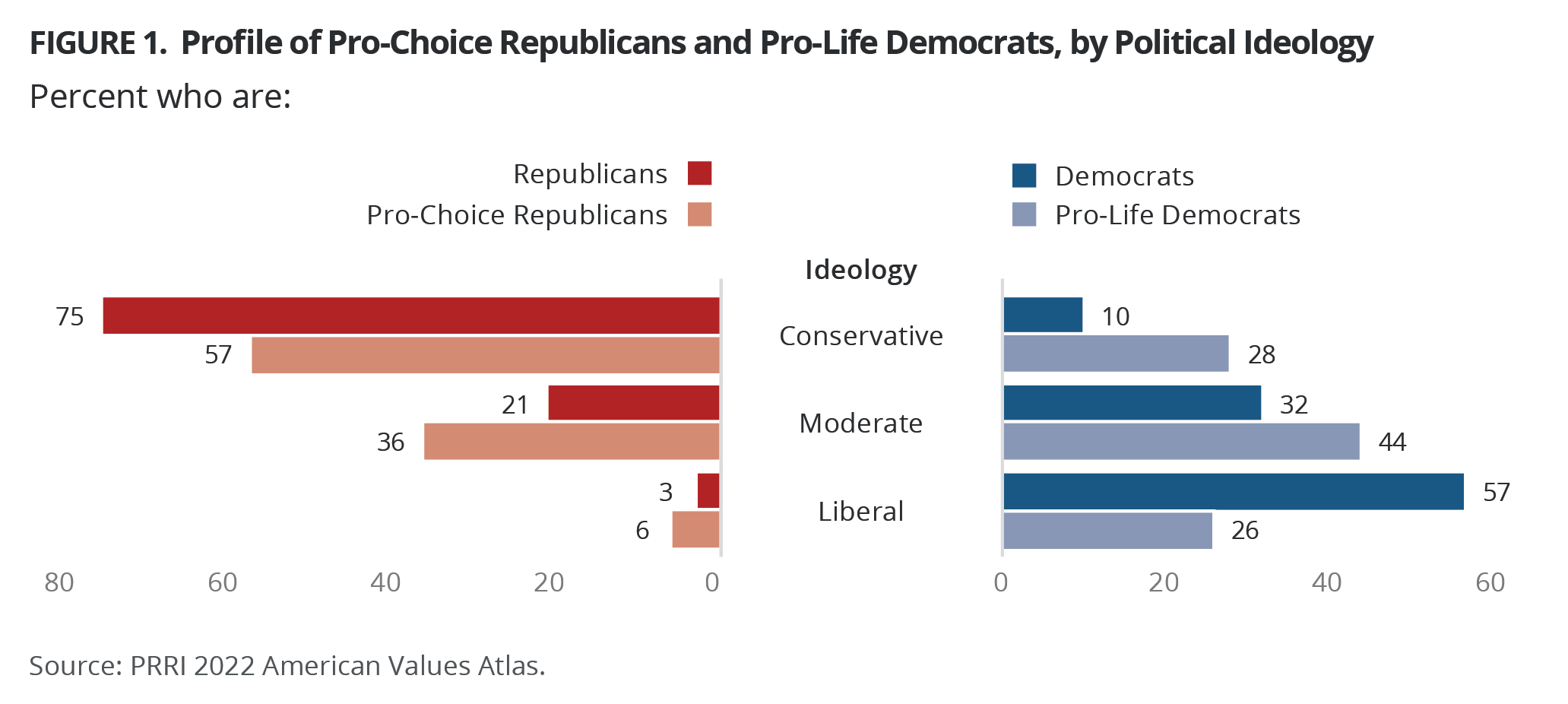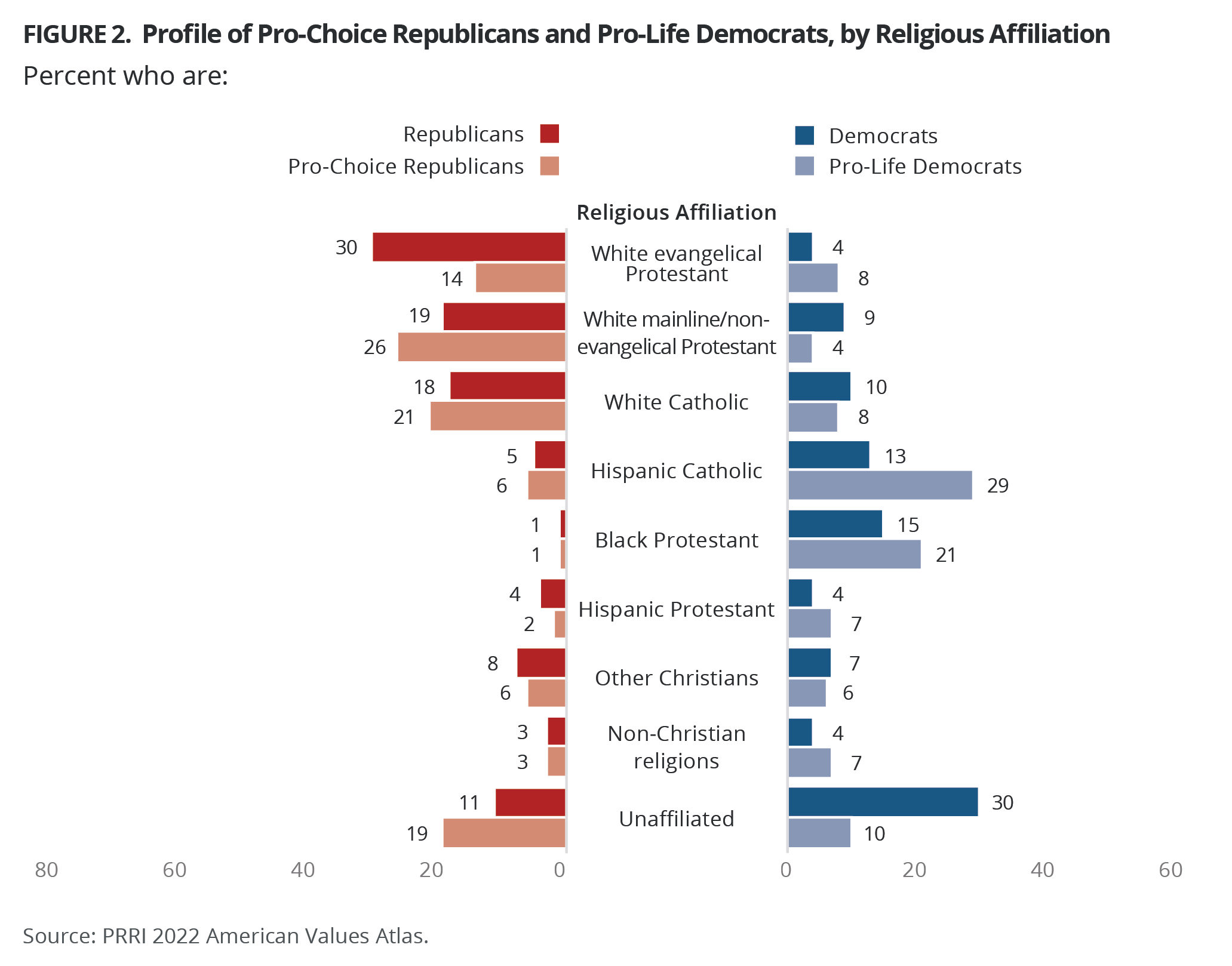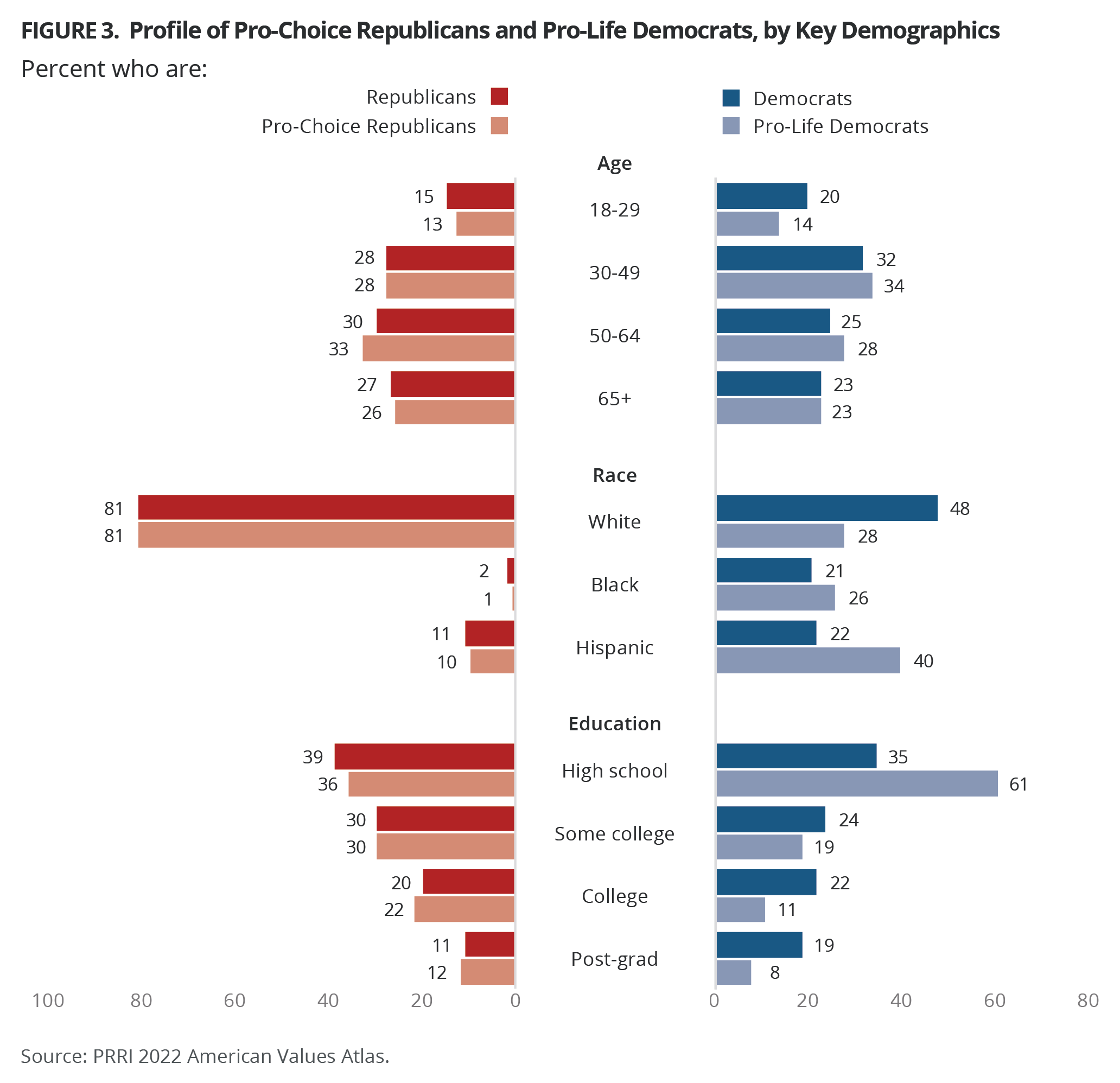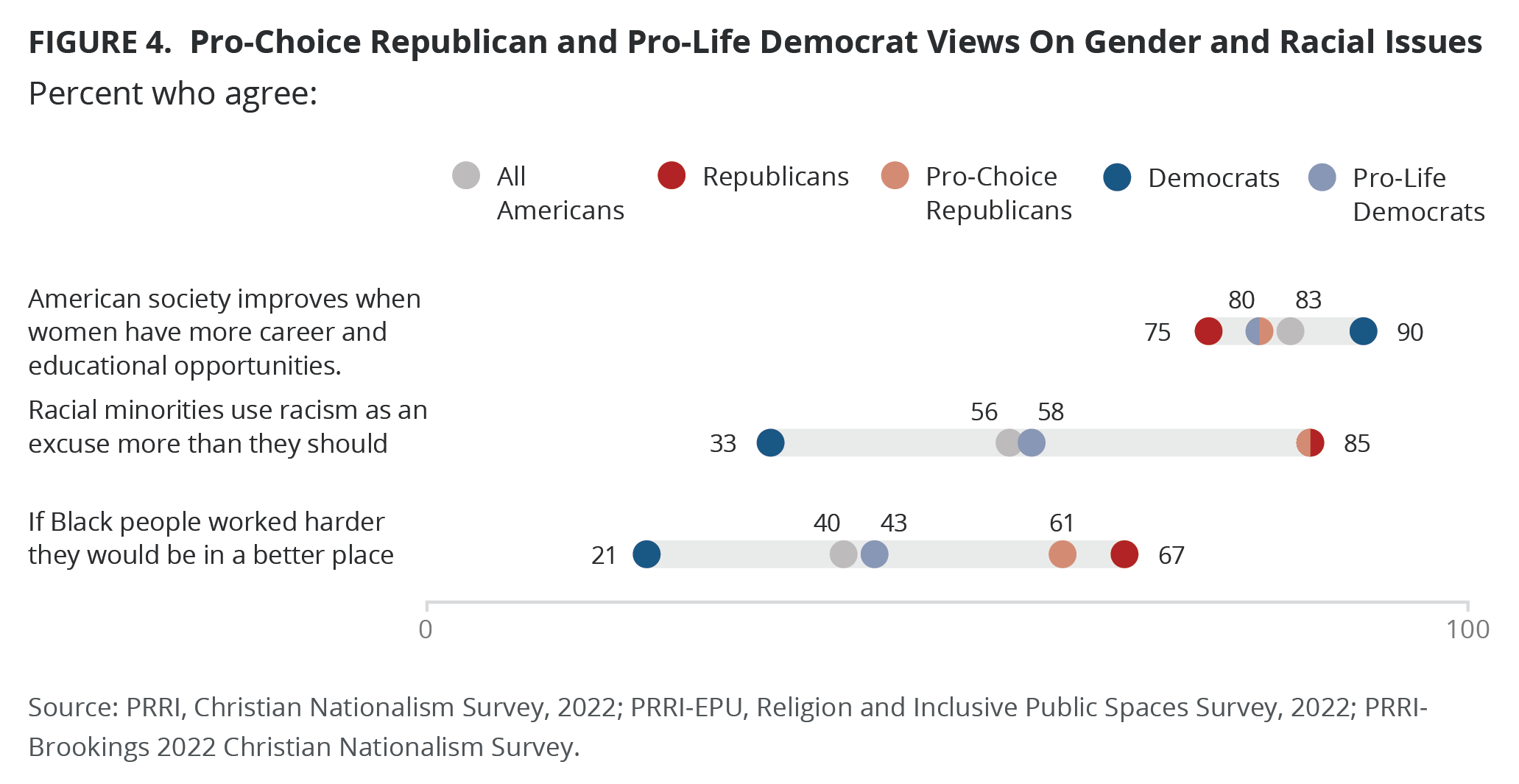The U.S. Supreme Court’s opinion in Dobbs v. Jackson Women’s Health Organization — which overturned the 1973 landmark decision Roe v. Wade — still looms months after its June 2022 announcement. Abortion is generally seen as a partisan issue, as both the Republican and Democratic parties have official stances on its legality, adopting official positions against and for legal abortion.
The PRRI 2022 American Values Atlas (AVA) survey found that most people who identify with the two major parties agree with their party’s official platform on abortion: 63% of Republicans say abortion should be illegal in all or most cases, while 86% of Democrats say it should be legal in all or most cases.
There are, however, partisans who disagree with their parties regarding the issue of abortion: 36% of Republicans whom we dub “pro-choice Republicans” believe it should be legal in all or most cases, while 14% of Democrats believe it should be illegal in all or most cases, hence the label “pro-life Democrats.”[1] Both groups break with their party line on the issue. While the profile of “pro-choice” Republicans closely resemble all Republicans, there are marked differences between “pro-life” Democrats and all Democrats.
Pro-Choice Republicans
Most pro-choice Republicans describe themselves as conservative (57%), but are less conservative than all Republicans (75%). They are also more moderate than all Republicans (36% vs. 21%). While very few Republicans self-identify as liberal, pro-choice Republicans are twice as likely as all Republicans to do so (6% vs. 3%). Additionally, pro-choice Republicans are almost equally as likely to be men (48%) as they are to be women (52%). This is reflective of the gender ratio among all Republicans in the dataset, where the break is 49% men and 51% women.
Pro-choice Republicans are less likely than all Republicans to identify as Christian (76% vs. 85%). Specifically, they are half as likely as all Republicans to identify as white evangelical Protestants (14% vs. 30%), but are more likely to identify as white mainline Protestants (26% vs. 19%). Pro-choice Republicans also tend to be slightly more likely to identify as white Catholics (21% vs. 18%). Further, pro-choice Republicans are about twice as likely as all Republicans to identify as unaffiliated (19% vs. 11%), but equally likely to identify as members of other non-Christian religions (4% for both).
Looking at the role that religion plays in the life of pro-choice Republicans, half (50%) believe that religion is the most or one among many important things in their life. This stands in stark contrast to all Republicans, as a strong majority of whom (70%) believe that religion is one of the most important things in their lives.
Pro-choice Republicans skew overwhelmingly white (81%), compared with 10% who identify as Hispanic, and 5% who identify as Asian American or Pacific Islander (AAPI). Just 2% of pro-choice Republicans identify as Native Americans, and 1% each as either Black or multiracial; this echoes the racial makeup of all Republicans in the survey, as 81% identify as white, 11% as Hispanic, 4% as AAPI, 2% each as either Black or Native American, and 1% as multiracial.
Only 13% of pro-choice Republicans are between the ages 18 and 29, compared with one-third of pro-choice Republicans ages 50-64 (33%), and 28% between the ages of 30-49. Slightly more than one in four (26%) are older than 65. These percentages are very similar to those of all Republicans.
Over one-third of pro-choice Republicans have a high school diploma or less (36%), 30% have some college education, 22% hold a bachelor’s degree, and 12% have post-graduate degrees. This closely matches the educational makeup of all Republicans (39%, 30%, 20%, and 11%, respectively).
While the proportion of pro-choice Republicans who reside in the Midwest (23%) and West (22%) mirror all Republicans (22% and 20%, respectively), pro-choice Republicans are more likely than all Republicans to reside in the Northeast (19% vs. 15%), and less likely to reside in the South (37% vs. 42%).
Pro-Life Democrats
Compared to all Democrats, a larger portion of pro-life Democrats identify as conservative (28% vs. 10%) and moderate (44% vs. 32%) and are also half as likely as all Democrats to identify as liberal (26% vs. 57%). The gender divide of pro-life Democrats is dominated by women (58%) compared with men (42%). This is reflective of all Democrats, with 56% women and 44% men.
While Democrats are generally less likely to identify as Christians (61%), pro-life Democrats are notably more likely to do so (84%). Interestingly, pro-life Democrats are substantially more likely than all Democrats to identify as Hispanic Catholic (29% vs. 13%), Black Protestant (21% vs. 15%), white evangelical Protestant (8% vs. 4%), and Hispanic Protestant (7% vs. 4%) and are less likely to identify as white mainline Protestant (4% vs. 9%). Pro-life Democrats are also substantially less likely than all Democrats to identify as religiously unaffiliated (10% vs. 30%) and as members of non-Christian religions (5% vs. 9%).
Looking at the role of religion, pro-life Democrats overwhelmingly think religion is an important part of their life, with more than 7 in 10 (78%) thinking religion is the most important or one among many important things. Among all Democrats, only 47% believe religion is an important factor in their life.
Pro-life Democrats are half as likely as all Democrats to be white (28% vs. 48%). By contrast, they are twice as likely as all Democrats to be Hispanic (40% vs. 22%), and slightly more likely to be Black (26% vs. 21%). Pro-life Democrats are similarly likely as all Democrats to be AAPI (4% vs. 7%), Native American (2% vs. 1%), and multiracial (1% for both).
The age of pro-life Democrats mirrors closely that of all Democrats, with the exception that they are less likely to be young (14% vs. 20%). Just over one-third of pro-life Democrats (34%) are between the ages of 30 and 49, 28% are between 50 and 64, and 23% are older than 65.
Pro-life Democrats tend to have less formal education. They are about twice as likely as all Democrats to have a high school education or less (61% vs. 35%), and are notably less likely to have some college education (19% vs. 24%), a bachelor’s degree (11% vs. 22%), or a post-graduate degree (8% vs. 19%).
More than 4 in 10 pro-life Democrats live in the South (43%), compared with 36% of all Democrats. However, a smaller proportion of pro-life Democrats live in the Northeast (14% vs. 18%) and in the Midwest (15% vs. 19%), and are equally as likely as all Democrats to live in the West (28% vs. 26%).



Beliefs on Other Social Issues
Abortion is intertwined with many attitudes and can be a litmus test for attitudes on other political and social issues. When looking at agreement with the idea that American society improves when women have more career and educational opportunities, the PRRI-Brookings 2022 Christian Nationalism Survey shows that the vast majority of Americans agree with this statement (83%). Pro-choice Republicans are more likely than all Republicans to agree with women’s career and educational opportunities (80% vs. 75%). By contrast, pro-life Democrats are less likely to agree than all Democrats (80% vs. 90%), closing the partisan gap.
When it comes to topics regarding race, pro-life Democrats have drastically different opinions from all Democrats, while pro-choice Republicans vary less. The PRRI-EPU Religion and Inclusive Public Spaces survey shows that a majority of pro-choice Republicans and all Republicans (both 85%) agree that “racial minorities use racism as an excuse more than they should.” This percentage is substantially much higher for pro-life Democrats (58%) than it is for all Democrats (33%). Similarly, while pro-choice Republicans (61%) are less likely than all Republicans (67%) to believe the statement, “It’s really a matter of some people not trying hard enough; if Black Americans would only try harder, they could be just as well off as white Americans,” these percentages are more than double the amount between pro-life Democrats (43%) and all Democrats (21%).

[1] We recognize that the terms “pro-choice” and “pro-life” are typically adopted by movement advocates to describe themselves. For the purposes of this analysis, we adopt the terms solely for ease of understanding.
The U.S. Supreme Court’s opinion in Dobbs v. Jackson Women’s Health Organization — which overturned the 1973 landmark decision Roe v. Wade — still looms months after its June 2022 announcement. Abortion is generally seen as a partisan issue, as both the Republican and Democratic parties have official stances on its legality, adopting official positions against and for legal abortion.
The PRRI 2022 American Values Atlas (AVA) survey found that most people who identify with the two major parties agree with their party’s official platform on abortion: 63% of Republicans say abortion should be illegal in all or most cases, while 86% of Democrats say it should be legal in all or most cases.
There are, however, partisans who disagree with their parties regarding the issue of abortion: 36% of Republicans whom we dub “pro-choice Republicans” believe it should be legal in all or most cases, while 14% of Democrats believe it should be illegal in all or most cases, hence the label “pro-life Democrats.”[1] Both groups break with their party line on the issue. While the profile of “pro-choice” Republicans closely resemble all Republicans, there are marked differences between “pro-life” Democrats and all Democrats.
Pro-Choice Republicans
Most pro-choice Republicans describe themselves as conservative (57%), but are less conservative than all Republicans (75%). They are also more moderate than all Republicans (36% vs. 21%). While very few Republicans self-identify as liberal, pro-choice Republicans are twice as likely as all Republicans to do so (6% vs. 3%). Additionally, pro-choice Republicans are almost equally as likely to be men (48%) as they are to be women (52%). This is reflective of the gender ratio among all Republicans in the dataset, where the break is 49% men and 51% women.
Pro-choice Republicans are less likely than all Republicans to identify as Christian (76% vs. 85%). Specifically, they are half as likely as all Republicans to identify as white evangelical Protestants (14% vs. 30%), but are more likely to identify as white mainline Protestants (26% vs. 19%). Pro-choice Republicans also tend to be slightly more likely to identify as white Catholics (21% vs. 18%). Further, pro-choice Republicans are about twice as likely as all Republicans to identify as unaffiliated (19% vs. 11%), but equally likely to identify as members of other non-Christian religions (4% for both).
Looking at the role that religion plays in the life of pro-choice Republicans, half (50%) believe that religion is the most or one among many important things in their life. This stands in stark contrast to all Republicans, as a strong majority of whom (70%) believe that religion is one of the most important things in their lives.
Pro-choice Republicans skew overwhelmingly white (81%), compared with 10% who identify as Hispanic, and 5% who identify as Asian American or Pacific Islander (AAPI). Just 2% of pro-choice Republicans identify as Native Americans, and 1% each as either Black or multiracial; this echoes the racial makeup of all Republicans in the survey, as 81% identify as white, 11% as Hispanic, 4% as AAPI, 2% each as either Black or Native American, and 1% as multiracial.
Only 13% of pro-choice Republicans are between the ages 18 and 29, compared with one-third of pro-choice Republicans ages 50-64 (33%), and 28% between the ages of 30-49. Slightly more than one in four (26%) are older than 65. These percentages are very similar to those of all Republicans.
Over one-third of pro-choice Republicans have a high school diploma or less (36%), 30% have some college education, 22% hold a bachelor’s degree, and 12% have post-graduate degrees. This closely matches the educational makeup of all Republicans (39%, 30%, 20%, and 11%, respectively).
While the proportion of pro-choice Republicans who reside in the Midwest (23%) and West (22%) mirror all Republicans (22% and 20%, respectively), pro-choice Republicans are more likely than all Republicans to reside in the Northeast (19% vs. 15%), and less likely to reside in the South (37% vs. 42%).
Pro-Life Democrats
Compared to all Democrats, a larger portion of pro-life Democrats identify as conservative (28% vs. 10%) and moderate (44% vs. 32%) and are also half as likely as all Democrats to identify as liberal (26% vs. 57%). The gender divide of pro-life Democrats is dominated by women (58%) compared with men (42%). This is reflective of all Democrats, with 56% women and 44% men.
While Democrats are generally less likely to identify as Christians (61%), pro-life Democrats are notably more likely to do so (84%). Interestingly, pro-life Democrats are substantially more likely than all Democrats to identify as Hispanic Catholic (29% vs. 13%), Black Protestant (21% vs. 15%), white evangelical Protestant (8% vs. 4%), and Hispanic Protestant (7% vs. 4%) and are less likely to identify as white mainline Protestant (4% vs. 9%). Pro-life Democrats are also substantially less likely than all Democrats to identify as religiously unaffiliated (10% vs. 30%) and as members of non-Christian religions (5% vs. 9%).
Looking at the role of religion, pro-life Democrats overwhelmingly think religion is an important part of their life, with more than 7 in 10 (78%) thinking religion is the most important or one among many important things. Among all Democrats, only 47% believe religion is an important factor in their life.
Pro-life Democrats are half as likely as all Democrats to be white (28% vs. 48%). By contrast, they are twice as likely as all Democrats to be Hispanic (40% vs. 22%), and slightly more likely to be Black (26% vs. 21%). Pro-life Democrats are similarly likely as all Democrats to be AAPI (4% vs. 7%), Native American (2% vs. 1%), and multiracial (1% for both).
The age of pro-life Democrats mirrors closely that of all Democrats, with the exception that they are less likely to be young (14% vs. 20%). Just over one-third of pro-life Democrats (34%) are between the ages of 30 and 49, 28% are between 50 and 64, and 23% are older than 65.
Pro-life Democrats tend to have less formal education. They are about twice as likely as all Democrats to have a high school education or less (61% vs. 35%), and are notably less likely to have some college education (19% vs. 24%), a bachelor’s degree (11% vs. 22%), or a post-graduate degree (8% vs. 19%).
More than 4 in 10 pro-life Democrats live in the South (43%), compared with 36% of all Democrats. However, a smaller proportion of pro-life Democrats live in the Northeast (14% vs. 18%) and in the Midwest (15% vs. 19%), and are equally as likely as all Democrats to live in the West (28% vs. 26%).



Beliefs on Other Social Issues
Abortion is intertwined with many attitudes and can be a litmus test for attitudes on other political and social issues. When looking at agreement with the idea that American society improves when women have more career and educational opportunities, the PRRI-Brookings 2022 Christian Nationalism Survey shows that the vast majority of Americans agree with this statement (83%). Pro-choice Republicans are more likely than all Republicans to agree with women’s career and educational opportunities (80% vs. 75%). By contrast, pro-life Democrats are less likely to agree than all Democrats (80% vs. 90%), closing the partisan gap.
When it comes to topics regarding race, pro-life Democrats have drastically different opinions from all Democrats, while pro-choice Republicans vary less. The PRRI-EPU Religion and Inclusive Public Spaces survey shows that a majority of pro-choice Republicans and all Republicans (both 85%) agree that “racial minorities use racism as an excuse more than they should.” This percentage is substantially much higher for pro-life Democrats (58%) than it is for all Democrats (33%). Similarly, while pro-choice Republicans (61%) are less likely than all Republicans (67%) to believe the statement, “It’s really a matter of some people not trying hard enough; if Black Americans would only try harder, they could be just as well off as white Americans,” these percentages are more than double the amount between pro-life Democrats (43%) and all Democrats (21%).

[1] We recognize that the terms “pro-choice” and “pro-life” are typically adopted by movement advocates to describe themselves. For the purposes of this analysis, we adopt the terms solely for ease of understanding.